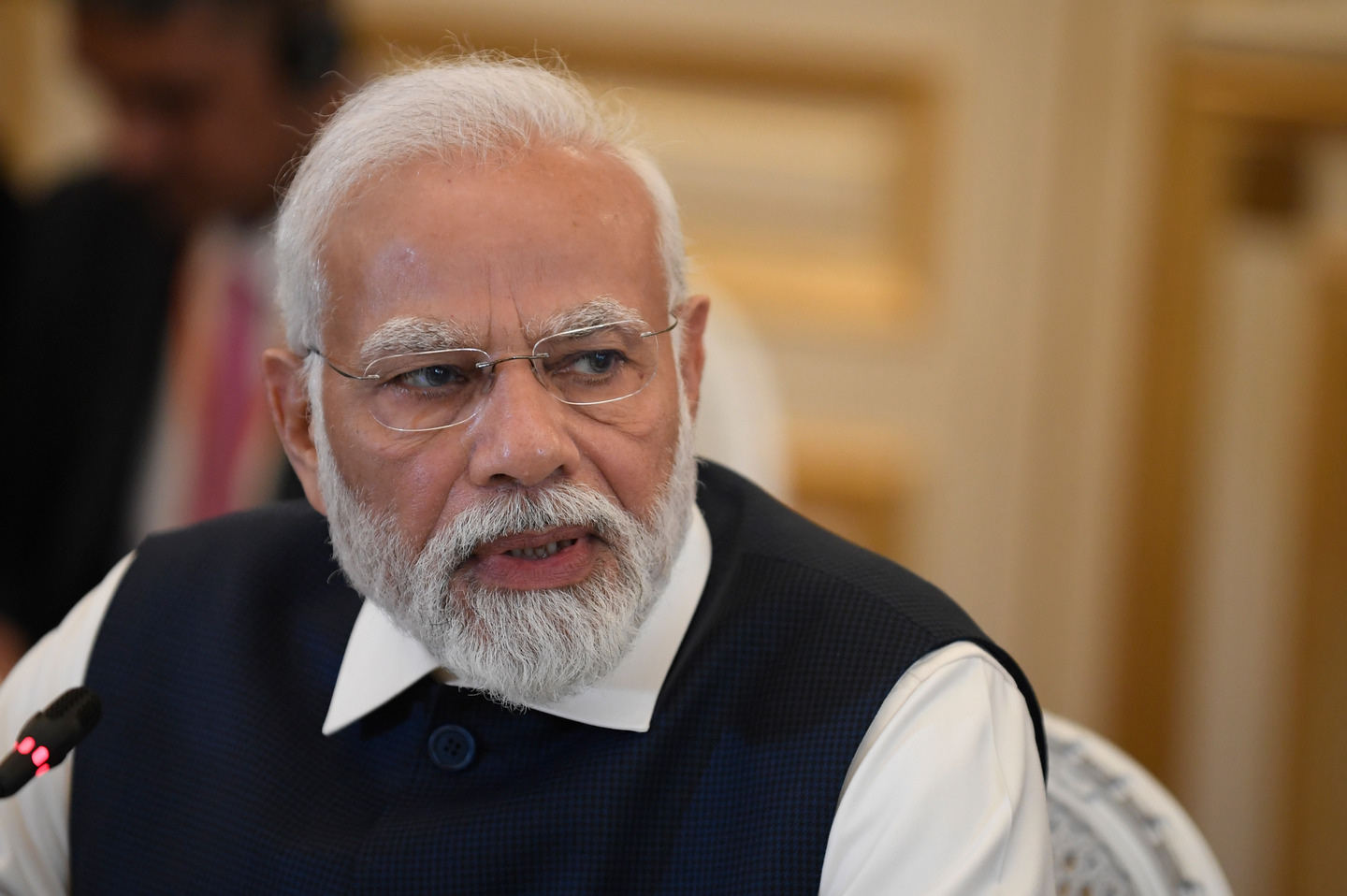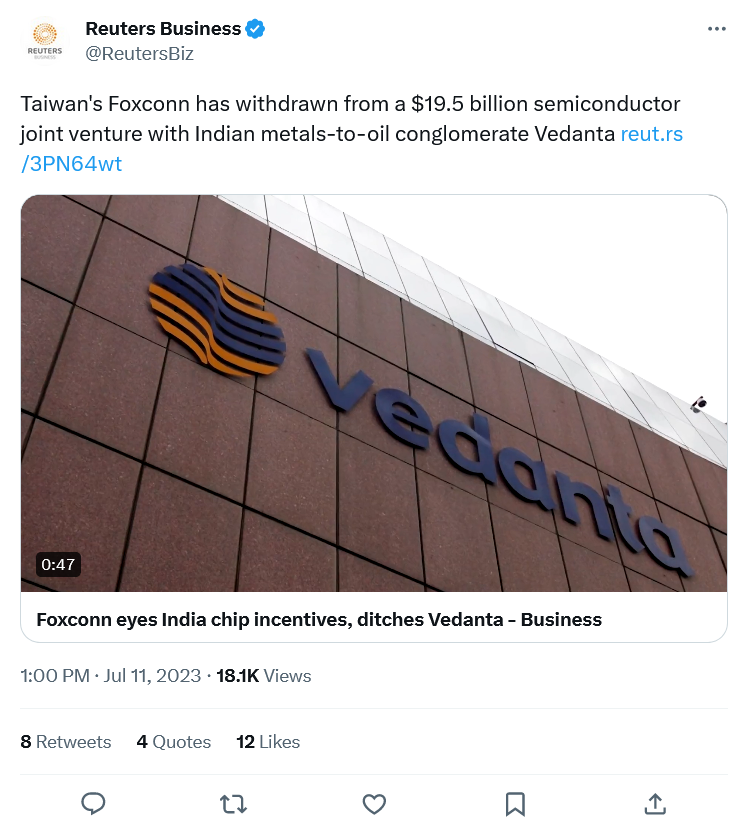Exactly what’s going on with Foxconn in India?

• Foxconn had been planning a multi-billion dollar semiconductor plant in India.
• Foxconn and Vedanta said the idea was dissolved “by mutual agreement.”
• Foxconn has since announced much more modest plans in India.
The deal has been the stuff of tech industry headlines for over a year. Foxconn, one of Apple’s leading links in its component supply chain, had a deal with Vedanta, to build a $19bn semiconductor plant in India. In Prime Minister Nahendra Modi’s home state of Gujarat, no less, which would have done wonders for the Prime Minister’s local political strength.
The idea of India’s rise as one of the next great high-tech industrial superpowers goes far beyond the Foxconn deal, but that deal would certainly have been a significant storytelling point in the narrative.
Then, last week, Foxconn announced that the $19bn plant deal was off. Vedanta, said the company, would be taking complete control of the venture, after “recognition from both sides that the project was not moving fast enough.”

Prime Minister Modi’s home state lost out on the Foxconn deal. Source: Julien de Rosa/Pool/AFP
Foxconn picking up pieces in India.
Vedanta Group went on to quickly paper over the cracks in the broken deal, with Akarsh Hebbar, global managing director of Vedanta Semiconductors and Display, saying the company had “tied up with technology and equity partners for its semiconductor fabrication project and with Innolux for its display fab unit.
It’s worth noting that Innolux has yet to either confirm or deny its involvement in the display fab unit project.
The idea that the project was not moving fast enough – and that those delays were enough to collapse a deal of this size might seem far-fetched at first glance.
After all, the deal was worth $19bn in hard currency, significant business investment within the chip supply chain, and not for nothing, a potent signal to Apple about Foxconn’s options and capacity outside of China in the wake of American pressure on the semiconductor world to decouple from China’s high-tech industries as much as possible.

Sometimes, things just fall apart. Entropy 1, multi-billion dollar deals…0.
But Reuters has previously reported on the time-sensitive nature of the deal, hinting that delays to the Indian incentive approvals may well have forced Foxconn’s hand in terms of being able to hold on to the project. It’s also conceivable – though less acknowledged by the company – that stalled talks with European chipmaker STMicroelectronics, ostensibly to calm Indian government concerns about an overall lack of chipmaking experience, may well have played a part in the seemingly sudden volte-face.
Foxconn seeks Taiwanese sugar daddy in India for manufacturing and more.
In the wake of the deal’s collapse, Foxconn behaved like a middle-aged, suddenly single man. It threw itself out there, looking to team up with almost anyone and everyone to maintain its idea of an Indian chip plant.
On July 15, it was said to be in talks with Taiwanese chip-god TSMC, and with Japan’s TMH, which has significant experience in running wafer fabs. The talks were understood to involve setting up at least four manufacturing lines in Dew Delhi. That would allow Foxconn, if we mercilessly over-extend the “suddenly single” metaphor, to “win” the break-up with Vedanta, and bounce back almost immediately.
While nothing has officially come of those negotiations as yet – it would, after all, be incredibly fast to acquire another major agreement – news of Foxconn’s speed dating with the biggest chipmaker in the world was swiftly followed by another announcement.
While in no way I the same league as its just-lost $19bn agreement with Vedanta, Foxconn is to invest $700m in a new manufacturing plant in Karnataka, in Southern India.
The new plant though is set to mostly focus on outer covers for iPhones – reaffirming the connection between Foxconn and Apple, but feeling significantly less tech-essential than Foxconn’s original plan.
Nevertheless, getting a new part of Apple’s business in India, however comparatively small, can only be a smart move right now – India recently became one of Apple’s top five iPhone markets in the world, with almost 7% of the world’s iPhone sales happening in the country.
Indian iPhone production also trebled during the course of the financial year 2022, and a widely-publicised trip to India by Apple CEO Tim Cook signaled, perhaps more clearly than any statistic or balance sheet, the idea that Apple is hoping to play a big part in India’s journey towards becoming a high-tech power.

The tech future of India will benefit from Apple’s investment – and the interest of Apple’s suppliers.
Whether Foxconn’s plans to do something bigger in terms of manufacturing with TSMC and TMH in New Delhi come to anything remains to be seen. There are arguments that none of the Indian government’s fears about the $19bn Vedanta deal have necessarily been assuaged, though a partnership with TSMC would certainly wave away any conceivable doubts about a lack of chipmaking experience.
Foxconn finds smart expansion in India with iPhone exteriors.
For the moment, while it works on those plans, Foxconn has at least its $700m dollar deal in Karnataka state to salvage its expanded interests in India.
“The state is ready to provide full support, offering land required to setup the manufacturing unit, in the 100 acres of land available in the Japanese industrial Park near Tumakuru,” said MB Patil, Karnataka minister of large & medium industries and infrastructure development, in significant contrast to the incentive approval issues that may have scuppered the company’s landmark deal with Vedanta.











